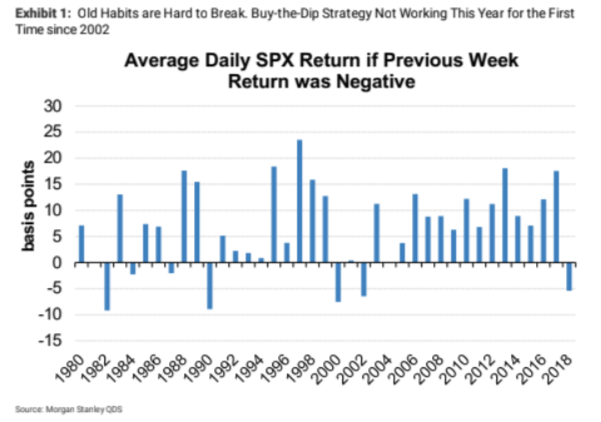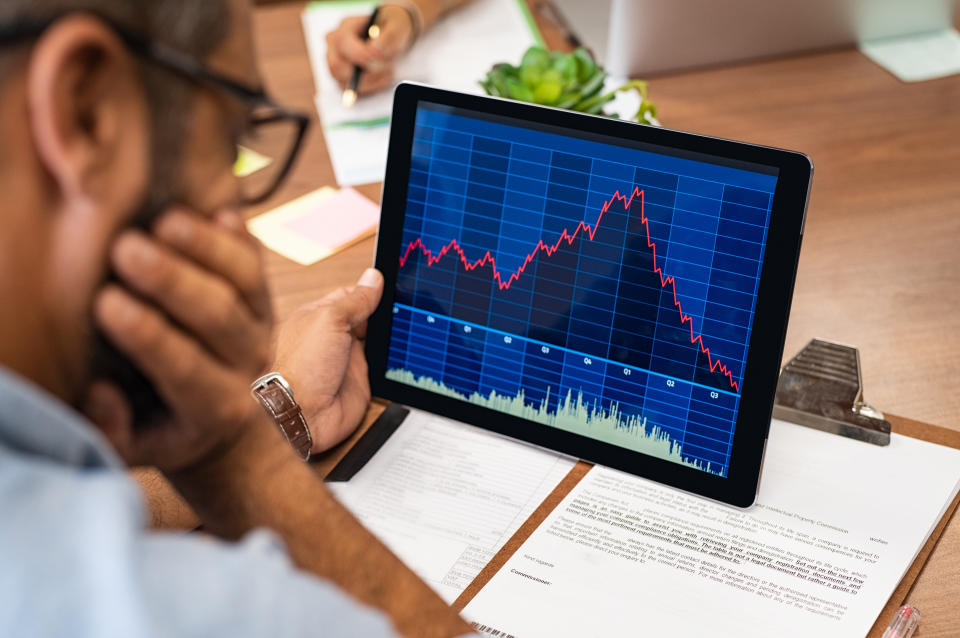Tech rout drags markets sharply lower
Equities slid Monday as tech stocks continued their rout.
The S&P 500 (^GSPC) fell 1.67%, or 45.54 points, as of market close. The Dow (^DJI) tumbled 1.56%, or 395.78 points, led by declines in industrial giant Boeing (BA).
The tech-heavy Nasdaq (^IXIC) fell 3.03%, or 219.4 points, as Apple and other big tech stocks tumbled. Shares of Apple declined following a report Monday that the device-maker had slashed iPhone production, wreaking havoc on the tech giant’s suppliers. Facebook (FB), still reeling from a New York Times report last week detailing the company’s crisis management strategy following the Cambridge Analytica data scandal, hit a 52-week low during intraday trading Monday and posted its third consecutive day of steep declines.
Although the S&P 500 index has fallen only as low as to corrective levels since hitting its September intraday high, price action among stocks this year suggests “we are in the midst of a bear market,” Michael Wilson of Morgan Stanley wrote in a note to clients Monday. A bear market is defined as when market prices decline 20% from a previous high. More than 40% of the stocks in the S&P 500 are down at least 20% this year, Wilson noted.
“With the forward 12-month P/E for the S&P 500 having fallen 18% from its peak in December last year to its low at the end of October, we think 90% of the valuation damage from the Rolling Bear market is complete,” he said.
Over the past several months, “it’s become apparent even to the casual observer that the US equity market is acting differently,” he added. “Our view is that the market is sniffing out an earnings recession and a sharp deceleration in economic growth.”
Moreover, a “buy-the dip” strategy has not worked this year, Wilson added, and the only years this strategy hasn’t yielded positive returns was during bear markets, or the beginning of one. He attributed the phenomenon this year in part to the Federal Reserve’s shift from quantitative easing to quantitative tightening, with the central bank shrinking its balance sheet.

Continued trade tensions also continue to weigh on markets. Over the weekend, Vice President Mike Pence gave a speech at the APEC summit in Papua New Guinea indicating that the U.S. would not back down with tariffs on China until it concedes to the U.S.’s trade demands.
“We’ve put tariffs on $250 billion in Chinese goods, and we could more than double that number,” Pence said in prepared remarks. “But we hope for better. The United States though will not change course until China changes its ways.”
The speech follows comments from President Donald Trump Friday that indicated he was hopeful that the U.S. and China could strike a fair deal on trade, saying that the U.S. “may not have to” impose more tariffs. Trump, however, had added that there were still “four or five big things left off” the list of actions China was willing to do before a deal could be reached. Trump’s remarks had sent the industrials-heavy Dow higher Friday afternoon.
NEWS: Nissan plans to remove chairman Carlos Ghosn over financial misconduct
Japanese automaker Nissan plans to remove chairman Carlos Ghosn from the board following a months-long internal investigation that found that he had purposely under-reported his compensation to the Tokyo Stock Exchange, CEO Hiroto Saikawa confirmed in a press conference Monday. The board will vote on the dismissal Thursday. This follows an earlier statement from Nissan saying that the company had found that Ghosn engaged in numerous “significant acts of misconduct” including personal use of company assets. The company also said it will attempt to remove Representative Director Greg Kelly, who was also found to have had “deep involvement” in the misconduct.
Ghosn is known for having recovered Nissan from near-bankruptcy, bringing it together with France’s Renault SA and Mitsubishi Motors Corp. Shares of Renault SA (RNL.SA), which Ghosn leads as CEO, slid 7.61% to $59.40 each Monday.
“Ghosn is viewed as critical for value unlock,” Citi analysts, who give Renault a Buy rating, wrote in a note Monday. “It is important to note that the article does not suggest any wrong-doing by the company. The initial share price reaction shows how pivotal he is for any potential collapse in the Renault-Nissan structure.”
STOCKS: Apple slides again, JD.com posts weak results
Apple’s (AAPL) stock extended losses after falling in early trading Monday. The Wall Street Journal reported that the company is cutting production for its newest models of iPhones, creating issues for the device-seller’s suppliers. The WSJ article follows a slew of Apple’s suppliers hinting at decreased demand from the iPhone-maker. Last week, chip suppler Qorvo (QRVO) cut its quarterly forecast and cited “demand changes for flagship smartphones,” and Skyworks Solutions (SWKS) earlier delivered lower guidance due to weakness in the premium smartphone market, the company said. Shares of Apple fell 3.96% to $185.86 each as of market close. The stock is down about 16% since reporting fourth-quarter results November 1.

JD.com (JD) reported third-quarter revenue that fell short of consensus expectations and gave a tepid forecast for the current quarter. Revenue came in at 104.8 billion yuan ($15.1 billion), while analysts were expecting 105.7 billion yuan on average, according to Bloomberg data. The Chinese e-commerce company said it expects sales of 130 billion yuan to 135 yuan in the current quarter – which includes the busy Nov. 11 “Singles’ Day” sale event – compared to consensus expectations of 134.2 billion yuan. This is also the first time JD.com, a competitor to Alibaba (BABA), has posted a sequential decline in annual active customers, with the number falling to 305.2 million from 313.8 million in the previous quarter. Shares of JD.com fell 8.42% to $21.11 each as of market close on the Nasdaq.
The Walt Disney Company (DIS) received approval from Chinese regulators for its proposed acquisition of Twenty-First Century Fox (FOX), CNBC reported Monday. Disney received approval from US and EU regulators earlier this year, both of which included divestment conditions. The media giant still needs approval from several other countries. Shares of Disney fell 0.69% to $115.39 each, after initially rising following CNBC’s report. Fox’s stock climbed 1.7% to $48.54 each as of market close.
CRYPTO: Bitcoin falls below $5,000 for the first time since Oct. 2017
Prices for Bitcoin, the world’s largest cryptocurrency, fell about 12% to a low of $4,884.17 Monday, according to Coindesk data. Other coins also fell, with Ethereum down about 14% and XRP, the token for Ripple, down less than 1% as of 4:02 p.m. ET. The decline in cryptocurrencies comes amid a regulatory crackdown on digital coins, and the SEC on Friday announced its first civil penalties against two crypto companies that didn’t register their initial coin offerings as securities. Cryptocurrency has also seen renewed volatility since the hard fork of Bitcoin Cash last week.
ECONOMY: NAHB Index plummets to lowest level since 2016
The National Association of Home Builders Housing Market Index plunged to 60 in November, the lowest level in more than two years. The 8-point decline from the October reading marks the sharpest drop since February 2014. Consensus estimates had been for a November reading of 67, according to Bloomberg data.
The NAHB attributed the decrease to “growing affordability concerns,” but noted that “builder sentiment still remains in positive territory.”
“For the past several years, shortages of labor and lots along with rising regulatory costs have led to a slow recovery in single-family construction,” NAHB Chief Economist Robert Dietz said in a statement. “While home price growth accommodated increasing construction costs during this period, rising mortgage interest rates in recent months coupled with the cumulative run-up in pricing has caused housing demand to stall.”
—
Emily McCormick is a reporter for Yahoo Finance. Follow her on Twitter: @emily_mcck
Follow Yahoo Finance on Twitter, Facebook, Instagram, Flipboard, LinkedIn, and reddit.
Read more from Emily:
Netflix user growth beats expectations, shares spike
Now is a ‘once-in-a-lifetime chance’ to invest in US pot companies, investor says
There are ‘4 headwinds’ facing markets rights now

 Yahoo Finance
Yahoo Finance 